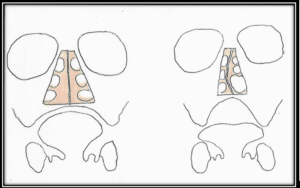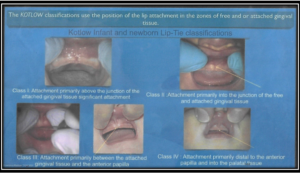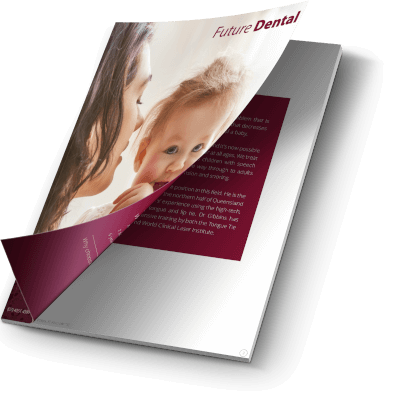Lip and Tongue Tie Cairns
Modern medicine is an amazing thing, and it’s now possible to treat lip and tongue ties with a laser at all ages except 1 to 4.5 years.
Future Dental is pleased to be able to offer this treatment, however, it is a lot easier in fairly newborn babies up to 6 months or so and kids over 6 years of age.
How can lip or tongue ties (Ankyloglossia) be treated?
Your doctor, midwife or lactation consultant may diagnose an anterior or posterior tongue tie, or an upper lip tie. The best-qualified person to diagnose these problems is an IBCLC (International Board Certified Lactation Consultant) or a dentist with broad training and experience in these problems. A highly experienced Lactation Consultant,’ an IBCLC, Dr Gibbins has been treating these problems by laser since 2003 in all age groups.
We invite you to consult with your IBCLC and even have them attend your visit for the procedure or diagnosis with us. Only an expert can tell if a normal anatomical frenulum is a problem or not, and the Dobrich Assessment and Score and Functional History for Mother and Infant is the basis for diagnosis.
Some GP doctors, Paediatricians, midwives and lactation consultants may use scissors and some surgeons use a scalpel.
Future Dental exclusively uses the Waterlase Laser
Future Dental is the only practice in North Queensland (including those in Townsville) offering the use of the Waterlase Laser for these procedures. Other lasers work very differently and cut by quite intense heat causing soft tissue charring.
The particular Laser (2780nM wavelength) is the most efficient tool to surgically treat lip, cheek and tongue ties. Its advantages are:-
- Minimum pain for baby
- Seals blood vessels so almost never any bleeding
- Seals nerve endings so pain afterwards for baby does not usually return for 3-4 hours
- Seals lymphatic vessels so no swelling afterwards
- Sterilises the surgical site as it goes.
This laser is by far the gentlest and safest technique with virtually no pain, bleeding or post-operative swelling, no stitches required and most rapid healing. Baby can feed immediately after. The laser also sterilises the surgical site as it works so post-op infection is rare.
Our Waterlase MDX is the gentlest of all laser wavelengths to use and causes no tissue charring like a Diode laser and is virtually painless for babies. It is also the safest for eyes, with a very short Nominal Ocular Hazard Distance compared to other laser wavelengths where use of specific wavelength filtering protective glasses for all in the room is mandatory. It is the cleanest cutting laser and in almost all cases, the baby does not react at all to the actual laser release procedure but just complains about Mum or Dad swaddling them up in a blanket to hold their arms clear. We use a strong topical anaesthetic, so baby does not experience pain during the procedure, and cover baby’s eyes with a tissue during the releases. While we have several Diode Lasers also which can do the same thing, the Rolls Royce of lasers for these procedures is the Waterlase. We use this one exclusively for babies with tongue ties and lip ties.
Babies with a lip tie
There is a short window of time in which an infant can be treated through the use of our Waterlase MDX laser. In the first year of a child’s life, most Anaesthetists will not perform a general anaesthetic (GA) and will ask to wait until the child’s first birthday. It is mostly in the first few months of life where feeding problems for both baby and Mum occur, and in this age-group general anaesthetic is not an option.
After 12 months it will be easier for a GA and we will refer you to the best-qualified health practitioner for lip tie revision. As such, if you’re experiencing these symptoms with your newborn, we’d encourage you to seek our help as quickly as possible!
1 to 4.5 – 5 years old
After 12 months of age and up to age 4.5 – 5 years, it’s much easier for the procedure to be done using a laser again, but as a surgical procedure under a general anaesthetic. We will refer you to the best qualified in Cairns for this procedure under GA.
4.5 – 5 years and older
From the age of 4.5 – 5, it is again possible for us to treat this condition with the laser in our office under a local anaesthetic.
Adults at times will also require a release of tongue or lip ties for problems with gum problems, tooth crowding or Obstructive Sleep Apnoea.
What to expect for Mums and Dads.
We are very aware that these procedures are very psychologically difficult for Mums and Dads and it may render you to tears watching your tiny bub going through a procedure where no form of anaesthetic is safe or suitable.
We advise that you should not feed your baby for at least 90 minutes before the appointment, and to bring a generous sized clean baby blanket to swaddle the baby.
You may choose to leave the room and have our trained staff handle your baby during the procedure after we have examined them, but if you prefer for either Mum or Dad to hold the baby that is fine too.
We will ask you to sit knee to knee with the doctor with the baby’s feet in your lap and the baby’s head in the doctor’s lap and we will show you how to hold and support the baby.
We do not pretend that the baby will feel no discomfort, but it is our usual observation that the actual laser time use amounts only to probably a minute or two during the procedure with the baby moving around constantly where we only get a split second at a time to accurately deliver the laser beam to trim the restricted tissues.
We typically book up to an hour for the initial consultation and the procedure, if done at the same time, but usually 15 minutes for the initial assessment alone. We will further suggest that you have a consultation with our expert IBCLCs, Lactation Consultants, and also our recommended Chiropractor or Naturopath colleagues before you book to see usWe are very protective of the salivary ducts and veins under the bottom of the tongue, so we just have to be patient waiting to get those few moments when we activate the laser.
Sometimes in that actual tissue trimming time, babies actually stop crying when they notice a few drops of the distilled water from the laser in their mouths and then swallow and sometimes they definitely feel something sharp momentarily.
Fortunately, babies do not remember these things after the procedure is finished, and they go to Mum in a closed room and immediately feed properly and often well for the first time.


Frequently Asked Questions
What is a frenectomy procedure?
Frenectomy is a procedure in which little tissue extensions under the lips and tongue are carefully removed. These tissue excesses can cause a tongue-tie, also known as ankyloglossia, which can affect speech development in young children. Failure of the tongue to rest against the hard palate results in narrow dental arches, a high, vaulted palate, mouth-breathing, likely tooth crowding, and a deviated nasal septum. This is perhaps the most compelling reason to do a tongue-tie release procedure.
When can a frenectomy be performed?
It is important to know that there is only a short time window between birth and 12 months of age when the frenectomy procedure can be done.. After this, the only way in which the procedure can be performed is with a general anaesthetic or by a paediatrician or general practitioner using surgical scissors. An anaesthetist will not perform a general anaesthetic on an infant under 12 months of age without very good reason. From around the age of a year to seven years old, a general anaesthetic is required for a frenectomy. After that, it can be done routinely under local anaesthetic in our surgery.
How can lip or tongue ties (Ankyloglossia) be treated?
Lip or tongue ties, diagnosed by an IBCLC or experienced dentist, are effectively treated using the Waterlase MDX laser at Future Dental. This advanced laser minimises pain and bleeding by sealing blood vessels, nerves, and lymphatic vessels during the procedure. For infants under 12 months, the procedure is performed without general anaesthesia to address feeding difficulties early. From 1 to 5 years old, surgical revision under general anaesthesia is recommended, and from age 6 onwards, local anaesthesia suffices for the laser procedure in our office. This technique promotes rapid healing, allows immediate feeding post-procedure, and reduces the risk of infection due to its sterilising effect.
What are the signs that an adult may have a tongue tie?
Signs that an adult may have a tongue tie include difficulty sticking out the tongue past the lower front teeth, limited tongue mobility or range of motion, a heart-shaped or notched appearance of the tongue tip when extended, speech difficulties such as lisping or difficulty articulating certain sounds, challenges with oral hygiene due to difficulty reaching the teeth and gums with the tongue, jaw or neck pain, and in some cases, noticeable pulling or tension under the tongue when attempting to lift it.
What role do dentists play in diagnosing and treating tongue ties?
Dentists play a crucial role in diagnosing and treating tongue tie, a condition where the lingual frenulum (the tissue connecting the tongue to the floor of the mouth) is unusually short, tight, or thick, restricting tongue movement. Dentists, particularly paediatric dentists, are often the first healthcare professionals to identify tongue ties during routine examinations. They assess the extent of the restriction and its impact on oral functions such as breastfeeding, speech, and oral hygiene. Treatment typically involves a minor surgical procedure called a frenectomy, where the frenulum is cut or lasered to release the tongue. This procedure can significantly improve the patient’s ability to eat, speak, and maintain oral hygiene. Additionally, dentists work closely with other healthcare professionals, such as lactation consultants and speech therapists, to provide comprehensive care and ensure the best outcomes for their patients.
Lip and Tongue Ties in Cairns
If you think you or your baby has a Tongue or Lip Tie, please ask us to assess it. Our team of trained specialists at Future Dental are here to help, and you can contact us here.



